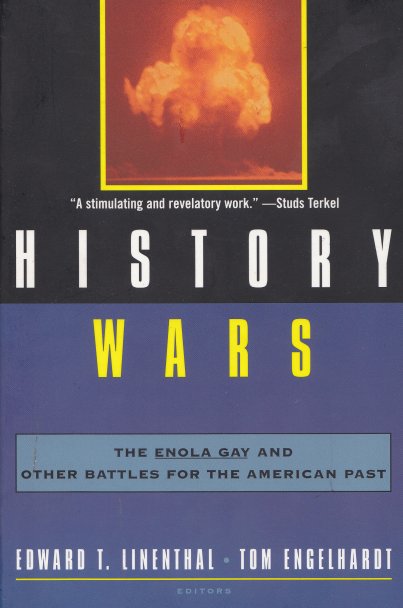
History Wars: The Enola Gay and Other Battles for the American Past

This book centers around a very interesting topic, and that is how the past is viewed by the participants in a war between each other. In this case, the issue is a planned Smithsonian exhibit of the Enola Gay, the plan that dropped the first atomic bomb ever used. The book goes into details about the various scripts and arguments, the problems ranging from one approach that more or less painted the Hiroshima and its people as the victims of the war to the other extreme, basically that they-got-what-they-deserved approach.
The old saying is “history is written by the victors.” However, after enough time, some people begin to question the “accepted” victor's view of a war and its events, as in this case.
One of the main things the book goes into is the Japanese view of the war, and how many Japanese consider themselves the victims of what happened. Some of these people still believe that Japan had to make war in order to preserve its own economy and traditions, since it was surrounded by colonial powers that had carved out most of Asia for themselves.
There is also the issue of the nature of bombing in the war. From the very start of the war, civilians were considered acceptable targets. The bombs that Germany dropped on Poland in 1939 made no distinction between civilians and military personnel. As the war wound on, there was sort of an attempt on the part of the Allies to hit military targets, but this basically ended when Britain started using carpet bombing, which tends to kill lots of civilians, and this approach found its expert use in the firebombing of Japanese cities which, in one case, killed more people than the atomic bomb did.
The book also discusses whether there was any actual need for the atomic bombs, since some reports and people believed that Japan would have surrendered by the end of the year anyhow. (I, personally, don't think they would have surrendered at all, and I think any actual invasion of the Japanese home islands would have been far bloodier than anything yet seen in the war.)
The book uses the name hibakusha for the Japanese survivors of the atomic bomb, although it doesn't really go into the problems that these people have in Japan, since they are often discriminated against by the Japanese.
(Also, something not actually covered in the book, was the type of hold the Japanese government had over the Japanese. The militarists had total control of the media (radio, newspapers, etc.) Dissenters ended up jailed or dead. )
This is basically a good book, although I think it really could have been expanded and covered other examples of how two sides in various wars looked at their own pasts. It's a topic that really needs more exploration.
Main Index
Japan main page
Japanese-American Internment Camps index page
Japan and World War II index page
|